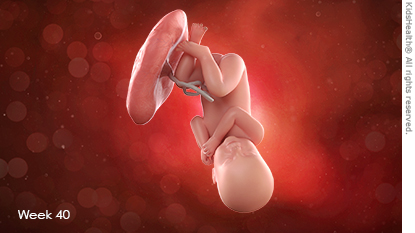Pregnancy Calendar: Week 40
You Baby's Development
After months of anticipation and preparation, your baby is here! Or maybe not — most women don't deliver right on their estimated due dates. Many first-time moms find themselves waiting up to 2 weeks after their due date for their baby to arrive.
 A baby born at 40 weeks weighs, on average, about 7 pounds, 4 ounces (3,300 grams) and measures about 20 inches (51 cm).
A baby born at 40 weeks weighs, on average, about 7 pounds, 4 ounces (3,300 grams) and measures about 20 inches (51 cm).
Don't expect your baby to look picture perfect right away, though — a newborn's head often is temporarily misshapen from the birth canal and may be covered with vernix and blood. Your baby's skin might have discolorations, dry patches, and rashes. This is all completely normal.

Right after birth, your health care provider will suction mucus out of your baby's mouth and nose, and you'll hear that long-awaited first cry. Your baby may then be placed on your stomach, and the umbilical cord will be cut — often by the baby's dad, if he chooses to do the honors!
A series of quick screening tests, such as the Apgar score, will assess your baby's vital signs and responsiveness. Then your little one be weighed and measured.
If you had a high-risk pregnancy or a C-section, a neonatologist (a doctor who specializes in newborn intensive care) will be at your delivery to take care of your baby right away. Your baby will receive any special care needed to adjust to life outside the womb — and then will be placed in your waiting arms.
Your Body
 This week is the moment you've been waiting for — you meet your baby! Before you do, though, you have to go through labor and delivery. You may have learned about the three stages of birth in your prenatal classes. The first stage of labor works to thin and stretch the cervix by contracting your uterus at regular intervals. The second stage is when you push your baby into the vaginal canal and out of your body. The third and final stage of labor is when you deliver the placenta.
This week is the moment you've been waiting for — you meet your baby! Before you do, though, you have to go through labor and delivery. You may have learned about the three stages of birth in your prenatal classes. The first stage of labor works to thin and stretch the cervix by contracting your uterus at regular intervals. The second stage is when you push your baby into the vaginal canal and out of your body. The third and final stage of labor is when you deliver the placenta.
If you don't go into labor within a week of your due date, your health care provider may recommend you have a nonstress test. This monitors fetal heart rate and movement to be sure that the baby is getting enough oxygen and that the nervous system is responding. Your health care provider will tell you more about this test, if it's needed.
If your labor isn't progressing, or if your health or your baby's health requires it, your health care provider may induce labor by artificially rupturing the membranes (breaking your water) or by giving you the hormone oxytocin or other medicines. A high-risk pregnancy or other potential complications may require a C-section delivery.
Some women know ahead of time that they'll deliver via C-section so can schedule and prepare for their baby's "birth day" in advance. This might help to ease feelings of disappointment that moms who can't deliver vaginally sometimes have.
If you had a C-section that wasn't planned, you may feel a little sad. Remember that having a C-section does not make your baby's birth any less special or your efforts any less amazing. After all, you went through major surgery to deliver your baby!
Congratulations and best of luck with your baby!

 Note: All information is for educational purposes only. For specific medical advice,
diagnoses, and treatment, consult your doctor.
Note: All information is for educational purposes only. For specific medical advice,
diagnoses, and treatment, consult your doctor.